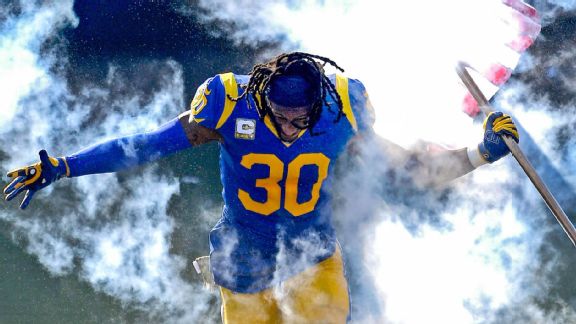Nort Spews
Well-known member
- Mar 16, 2019
- 127
- 1
Aug 21, 2019
When the time finally came for Mike Zimmer to be an NFL head coach, he realized he didn't really know how to do it. So he decided he'd lean as hard as he could on the thing he did know how to do: coach defense.
"When you first get somewhere, you've got to get them to buy in," said Zimmer, who spent 20 years as an NFL position coach or defensive coordinator before becoming coach of the Minnesota Vikings in 2014. "That's why, when I came here, I did everything -- I called the defense, I installed all the defensive stuff, I ran the meetings, all of that, because I wanted them to think that I was an expert at something. I'd never been an expert at being a head coach, so I wanted them to know, 'Hey, this guy's a good football coach. He knows what he's talking about.' And hopefully the defensive guys would tell the offensive guys."
2 Related
This year, there are six NFL head coaches who find themselves in that position for the first time. Some might turn out to be very good at the job. Some, assuredly, will not. From here, we can't know which will be which. But with the help of a couple of guys who've made the transition, we tried to get some idea of what it's like and how to give yourself the chance to pull it off.
"I think the scheduling is very important," said Anthony Lynn, who's entering his third season as coach of the Los Angeles Chargers. "You have to deal with media a lot more than you ever have in the past, and stuff like that can pull you away from your football team. Everything that comes across your desk, it's a lot more than just football. At the end of the day sometimes, I just want to go home, not be asked any questions and just dig in on football stuff or find some time to relax. But you're the CEO of the organization, so you have to know you're going to have a lot on your plate and you have to be prepared for it."
Lynn started 0-4 in 2017 but has gone 22-8 since, including a first-round playoff win in Baltimore in January. He's a longtime running backs coach who was a coordinator for part of the 2016 season in Baltimore before the Chargers gave him the big job. That's a slightly different path than others have taken.
Zimmer, entering his sixth season as the Vikings' coach, has a 48-33-1 record, and two seasons ago his team reached the NFC Championship Game. He'll probably always know more about defense than offense, but that's all right. Those 20 years of experience helped him get players on both sides of the ball to buy in to the idea of him as the man in charge.
 Everything you need this week:
Everything you need this week:
• Full schedule: All 16 games »
• Takeaways from Week 2 »
• Transaction tracker: Top news »
• How to shorten the preseason »
More NFL coverage »
"I think the biggest thing you learn as a head coach is you've really got to craft out time for what got you here, and for me, that's offensive football," said Frank Reich, who's going into his second season as coach of the Indianapolis Colts. "All of us who are first-time head coaches, we got there by being a good coordinator and being a, quote-unquote, expert in our respective fields."
The transition isn't easy, and it's not always successful. It has worked out for Zimmer, and it has worked out so far for Lynn and for Reich, whose Colts started 1-5 last season but ended the season at 10-6 and won a road playoff game in Houston. But there are plenty of recent examples of successful coordinators who couldn't make the transition to successful head coach. Guys like Hue Jackson, Ben McAdoo and Steve Wilks all, for one reason or another, weren't able to get enough traction to hold onto the big chair. It happens.
So we wanted to look at this year's six first-time head coaches (exempting, before you say anything, Bruce Arians and Adam Gase, who are new to their current jobs but have been head coaches before) and size up the distinctive challenge each one faces. What do the new coaches of the Packers, Bengals, Browns, Broncos, Dolphins and Cardinals have to do to make successful transitions into their new, very difficult jobs?
There are high expectations in Green Bay, and they start with new coach Matt LaFleur. Mike Roemer/AP Photo

Last year's stint in Tennessee was the first experience as a playcalling offensive coordinator for the longtime Kyle Shanahan and Sean McVay assistant. That surely didn't get him the Green Bay job, as the Titans were 25th in total offense and 27th in scoring offense.

Everything you need for a successful fantasy football season. Check it out!
• Ranks: PPR | non-PPR | Cheat Sheets
• Depth charts: Offense | Defense
• Mock drafts: PPR | Non-PPR
• Sign up now: It's free to play!
"Just the guys that I talked to in the league that have worked with him, we thought it would be a really good match, not only short-term with Aaron [Rodgers] but kind of long-term for what we're looking to do," Packers general manager Brian Gutekunst told me early in Packers training camp. "Developing quarterbacks. I always liked the system they ran, going back to the time when Atlanta kicked our ass a couple of years ago (in the 2016 NFC Championship Game). All of these guys have got to go through a process where they learn how they're going to do it. But my thing with him was, I knew he was going to do what it took to figure it out."
What LaFleur has to prove: That he can make a relationship work with Rodgers, of course, though he insists that's going better than outside perception indicates. But Gutekunst talked about the "long-term," and Green Bay is a place that doesn't fire coaches quickly. Big picture, LaFleur has to show that he can make that Shanahan/McVay offense work with him as the man in charge. That'll start by melding the concepts in which LaFleur has been trained with the unique skills of Rodgers, an all-time great quarterback.
"The closest guy to his ability from a mental standpoint that I've been around is Matt Ryan," LaFleur said of Rodgers. "Just his ability to get us in and out of things. We just did it a little bit differently, and we're going down that road right now to see where that healthy balance is. But he's pretty impressive, whether it's on the field or in the classroom. That's why it's been so much fun."
Zac Taylor spent 2018 as the Rams' quarterbacks coach, but he doesn't have as much experience as the other new head coaches. John Minchillo/Associated Press

Taylor's predecessor, Marvin Lewis, held the Bengals' head job for an astounding 16 seasons, so everything Taylor brings to Cincinnati is new. This can work in a new coach's favor, because sometimes players crave and respond to new stuff. Taylor, like LaFleur, was on McVay's coaching staff with the Rams, so offensively you can expect to see similar concepts. When I visited Bengals camp, there was a lot of talk about how Taylor has changed the practice plans and schedules to incorporate more rest periods and use sports science data to determine when to push players harder on the practice field and when to back off. Plenty of teams do this, and it's possible the Bengals in recent years under Lewis were doing some of it, too. But the vibe around the Bengals is "new," and Taylor is leaning into it.
 The Fantasy Draft Cheat Sheet
The Fantasy Draft Cheat Sheet
 Karabell picks: 'Do Not Draft' | 'Do Draft'
Karabell picks: 'Do Not Draft' | 'Do Draft'
 Karabell tier ranks: RBs | WRs
Karabell tier ranks: RBs | WRs
 Clay: My draft board | 13 breakouts
Clay: My draft board | 13 breakouts
"We're just doing what we're confident in, the ways we believe in, and hopefully the players enjoy that," Taylor said. "We want players to walk in excited to come to work every day."
What Taylor has to prove: Put simply, that he's qualified for the job. Experience-wise, LaFleur is Don Shula compared to this guy. Taylor called offensive plays for the Dolphins for five games at the end of a lost 2015 season, but otherwise he has never risen beyond quarterbacks coach until now. This might have been the most surprising hiring of the coaching cycle, and that's saying something. But what was he supposed to do? Turn down the job because he needed more seasoning?
"I was fortunate to be around Sean and always really impressed with how he handled things at a young age," Taylor said (he's 36; McVay is 33). "And the benefit to him is that he was always really open with the way he was doing everything. So you felt like, somebody kind of your age going through it and being real open with why he was doing everything, and that enables you when you get this job to feel like I've kind of already been in this because I got to watch Sean experience this for two years."
Freddie Kitchens had success with Baker Mayfield in 2018. How good could the Browns be this season? Photo by AP Photo/Ron Schwane

Kitchens was the Browns' running backs coach a year ago, the offensive coordinator for the final half of the season and then got the head coach job in January. "Meteoric rise" is kind of the theme here so far (at least until we get to Denver). He got the job in large part because of his role in quarterback Baker Mayfield's development as a rookie, but his range of responsibilities has now expanded dramatically.

More people play on ESPN than anywhere else. Join or create a league in the No. 1 Fantasy Football game! Sign up for free!
What Kitchens has to prove: That he can coach a talented team to its expectations. Quick personal digression: The first pro team I ever covered was the 1997 Florida Marlins. I actually covered them during the offseason prior to that year, when they were signing a bunch of star free agents to make what would ultimately be a successful World Series run. But before they signed all of those guys, they hired veteran manager Jim Leyland, who'd had experience managing talented Pittsburgh Pirates teams (with guys like Barry Bonds and Bobby Bonilla) to the playoffs. The Browns, obviously, have gone a different direction, and Kitchens knows that his main responsibility is to figure out how to make it all work together. Part of his plan is to invest the players in that project.
"It doesn't always have to be me that corrects somebody, or an offensive line coach that corrects somebody, or a coordinator that corrects somebody," Kitchens told me. "These guys need to start holding each other accountable, look to the right and look to the left and see who they can depend on. It's about dependability, accountability and reliability, and we're trying to figure out who we can do it with."
Brian Flores will have his hands full with a Dolphins team that shedded some of its best talent this offseason. AP Photo/Wilfredo Lee

Flores has only ever worked for the Patriots, as a scout and an assistant coach on special teams and defense. He was not technically the defensive coordinator last season, after Matt Patricia left to coach the Detroit Lions, but it seemed as if he'd been elevated to that level of responsibility and was only denied the title due to Belichickian semantics.
Regardless, he's another under-40 newcomer to the ranks who has already changed offensive line coaches and whose front office is widely believed to be trying to tank its season as part of a long-term rebuild. Good luck, Brian!
What Flores has to prove: That he has the right people in place to build an offense for him. Chad O'Shea left New England to become Flores' offensive coordinator in Miami, but that's not a job O'Shea has ever had before either. A couple of days into camp, Flores fired offensive line coach Pat Flaherty and replaced him with Dave DeGuglielmo, who has been through New England as well and can help implement the offense the Dolphins want to run.
There are a lot of what-ifs here, including at the quarterback position. And while the long-range focus in Miami might grant Flores a long leash, this is a league where the mandate is to score points right now. Defensive coaches whose offenses don't get off the ground can find themselves out of favor pretty quickly. Just ask Wilks -- or, who knows, Patricia a year from now.
Vic Fangio spent the last four seasons with the Bears, and he was Jim Harbaugh's defensive coordinator in San Francisco for four seasons before that. Photo by Ron Chenoy/USA TODAY Sports

This is one from the Mike Zimmer files. Fangio is 60 years old. His first NFL job was Saints linebackers coach in 1986, which you might or might not know was the year Sean McVay was born. Matt LaFleur turned 7 that year. Brian Flores turned 5. Zac Taylor, 3. You get the idea. Fangio's hire was pretty far out of the 2019 box.
• Why the Broncos turned to Joe Flacco
• Vikings look for Cousins to run more
• Nick Chubb primed for big Year 2
• Matt Gay embracing Bucs' pressure
• Lions have real-life fantasy sleeper in Ty Johnson
Broncos team president John Elway said he wanted a coach who was an expert on one side of the ball, and for Fangio that side is defense. He has been a defensive coordinator in the NFL or at the college level for 20 of the past 24 years. He's going to have to get used to watching the game from the sideline instead of the press box. There is lots of change here as Fangio finally gets his big break.
What Fangio has to prove: That he was being overlooked. Fangio was an exceptionally successful defensive coordinator who really never got serious looks when it was time for teams to hire head coaches. We've seen coordinators who spent a long time waiting for the call succeed, like Zimmer and Bruce Arians. We've seen extremely good defensive coordinators struggle to find success as head coaches, like Wade Phillips and Dom Capers.
Fangio's biggest obstacle could be similar to that of Flores -- find people who can build him a successful offense. But his place on the opposite end of the coaching age spectrum makes his a different kind of case.
Kliff Kingsbury and the Cardinals are pinning their future on No. 1 overall pick Kyler Murray, who will need to develop quickly. Photo by Kevin French/Icon Sportswire

Everything about this came out of the blue. Kingsbury was fired by Texas Tech in November, then a few weeks later Arizona was blowing up its whole plan so it could hire him. The Cardinals fired Wilks after only one year and traded quarterback Josh Rosen a year after drafting him 10th overall so they could pair Kingsbury with 2018 Heisman Trophy winner Kyler Murray. It's a bold experiment, to say the least.
What Kingsbury has to prove: That he can adapt his college offensive concepts to the NFL. When we saw this in 2013, it was called "Chip Kelly," and the former Oregon coach made the playoffs in his first year with the Eagles but didn't last. One of Kelly's problems was that his up-tempo offense asked too much of his defense and wore out the players on that side of the ball. Has Kingsbury learned enough about how to combat that effect of offensive tempo?
There's a lot that has to come together here yet, including, apparently, the way Murray claps before the snap. Perhaps no coaching hire on this list generated more skepticism around the league. Kingsbury has to show he can do something a lot of NFL insiders don't think can be done.
When the time finally came for Mike Zimmer to be an NFL head coach, he realized he didn't really know how to do it. So he decided he'd lean as hard as he could on the thing he did know how to do: coach defense.
"When you first get somewhere, you've got to get them to buy in," said Zimmer, who spent 20 years as an NFL position coach or defensive coordinator before becoming coach of the Minnesota Vikings in 2014. "That's why, when I came here, I did everything -- I called the defense, I installed all the defensive stuff, I ran the meetings, all of that, because I wanted them to think that I was an expert at something. I'd never been an expert at being a head coach, so I wanted them to know, 'Hey, this guy's a good football coach. He knows what he's talking about.' And hopefully the defensive guys would tell the offensive guys."
2 Related
This year, there are six NFL head coaches who find themselves in that position for the first time. Some might turn out to be very good at the job. Some, assuredly, will not. From here, we can't know which will be which. But with the help of a couple of guys who've made the transition, we tried to get some idea of what it's like and how to give yourself the chance to pull it off.
"I think the scheduling is very important," said Anthony Lynn, who's entering his third season as coach of the Los Angeles Chargers. "You have to deal with media a lot more than you ever have in the past, and stuff like that can pull you away from your football team. Everything that comes across your desk, it's a lot more than just football. At the end of the day sometimes, I just want to go home, not be asked any questions and just dig in on football stuff or find some time to relax. But you're the CEO of the organization, so you have to know you're going to have a lot on your plate and you have to be prepared for it."
Lynn started 0-4 in 2017 but has gone 22-8 since, including a first-round playoff win in Baltimore in January. He's a longtime running backs coach who was a coordinator for part of the 2016 season in Baltimore before the Chargers gave him the big job. That's a slightly different path than others have taken.
Zimmer, entering his sixth season as the Vikings' coach, has a 48-33-1 record, and two seasons ago his team reached the NFC Championship Game. He'll probably always know more about defense than offense, but that's all right. Those 20 years of experience helped him get players on both sides of the ball to buy in to the idea of him as the man in charge.

• Full schedule: All 16 games »
• Takeaways from Week 2 »
• Transaction tracker: Top news »
• How to shorten the preseason »
More NFL coverage »
"I think the biggest thing you learn as a head coach is you've really got to craft out time for what got you here, and for me, that's offensive football," said Frank Reich, who's going into his second season as coach of the Indianapolis Colts. "All of us who are first-time head coaches, we got there by being a good coordinator and being a, quote-unquote, expert in our respective fields."
The transition isn't easy, and it's not always successful. It has worked out for Zimmer, and it has worked out so far for Lynn and for Reich, whose Colts started 1-5 last season but ended the season at 10-6 and won a road playoff game in Houston. But there are plenty of recent examples of successful coordinators who couldn't make the transition to successful head coach. Guys like Hue Jackson, Ben McAdoo and Steve Wilks all, for one reason or another, weren't able to get enough traction to hold onto the big chair. It happens.
So we wanted to look at this year's six first-time head coaches (exempting, before you say anything, Bruce Arians and Adam Gase, who are new to their current jobs but have been head coaches before) and size up the distinctive challenge each one faces. What do the new coaches of the Packers, Bengals, Browns, Broncos, Dolphins and Cardinals have to do to make successful transitions into their new, very difficult jobs?
There are high expectations in Green Bay, and they start with new coach Matt LaFleur. Mike Roemer/AP Photo

Last year's stint in Tennessee was the first experience as a playcalling offensive coordinator for the longtime Kyle Shanahan and Sean McVay assistant. That surely didn't get him the Green Bay job, as the Titans were 25th in total offense and 27th in scoring offense.

Everything you need for a successful fantasy football season. Check it out!
• Ranks: PPR | non-PPR | Cheat Sheets
• Depth charts: Offense | Defense
• Mock drafts: PPR | Non-PPR
• Sign up now: It's free to play!
"Just the guys that I talked to in the league that have worked with him, we thought it would be a really good match, not only short-term with Aaron [Rodgers] but kind of long-term for what we're looking to do," Packers general manager Brian Gutekunst told me early in Packers training camp. "Developing quarterbacks. I always liked the system they ran, going back to the time when Atlanta kicked our ass a couple of years ago (in the 2016 NFC Championship Game). All of these guys have got to go through a process where they learn how they're going to do it. But my thing with him was, I knew he was going to do what it took to figure it out."
What LaFleur has to prove: That he can make a relationship work with Rodgers, of course, though he insists that's going better than outside perception indicates. But Gutekunst talked about the "long-term," and Green Bay is a place that doesn't fire coaches quickly. Big picture, LaFleur has to show that he can make that Shanahan/McVay offense work with him as the man in charge. That'll start by melding the concepts in which LaFleur has been trained with the unique skills of Rodgers, an all-time great quarterback.
"The closest guy to his ability from a mental standpoint that I've been around is Matt Ryan," LaFleur said of Rodgers. "Just his ability to get us in and out of things. We just did it a little bit differently, and we're going down that road right now to see where that healthy balance is. But he's pretty impressive, whether it's on the field or in the classroom. That's why it's been so much fun."
Zac Taylor spent 2018 as the Rams' quarterbacks coach, but he doesn't have as much experience as the other new head coaches. John Minchillo/Associated Press

Taylor's predecessor, Marvin Lewis, held the Bengals' head job for an astounding 16 seasons, so everything Taylor brings to Cincinnati is new. This can work in a new coach's favor, because sometimes players crave and respond to new stuff. Taylor, like LaFleur, was on McVay's coaching staff with the Rams, so offensively you can expect to see similar concepts. When I visited Bengals camp, there was a lot of talk about how Taylor has changed the practice plans and schedules to incorporate more rest periods and use sports science data to determine when to push players harder on the practice field and when to back off. Plenty of teams do this, and it's possible the Bengals in recent years under Lewis were doing some of it, too. But the vibe around the Bengals is "new," and Taylor is leaning into it.




"We're just doing what we're confident in, the ways we believe in, and hopefully the players enjoy that," Taylor said. "We want players to walk in excited to come to work every day."
What Taylor has to prove: Put simply, that he's qualified for the job. Experience-wise, LaFleur is Don Shula compared to this guy. Taylor called offensive plays for the Dolphins for five games at the end of a lost 2015 season, but otherwise he has never risen beyond quarterbacks coach until now. This might have been the most surprising hiring of the coaching cycle, and that's saying something. But what was he supposed to do? Turn down the job because he needed more seasoning?
"I was fortunate to be around Sean and always really impressed with how he handled things at a young age," Taylor said (he's 36; McVay is 33). "And the benefit to him is that he was always really open with the way he was doing everything. So you felt like, somebody kind of your age going through it and being real open with why he was doing everything, and that enables you when you get this job to feel like I've kind of already been in this because I got to watch Sean experience this for two years."
Freddie Kitchens had success with Baker Mayfield in 2018. How good could the Browns be this season? Photo by AP Photo/Ron Schwane

Kitchens was the Browns' running backs coach a year ago, the offensive coordinator for the final half of the season and then got the head coach job in January. "Meteoric rise" is kind of the theme here so far (at least until we get to Denver). He got the job in large part because of his role in quarterback Baker Mayfield's development as a rookie, but his range of responsibilities has now expanded dramatically.

More people play on ESPN than anywhere else. Join or create a league in the No. 1 Fantasy Football game! Sign up for free!
What Kitchens has to prove: That he can coach a talented team to its expectations. Quick personal digression: The first pro team I ever covered was the 1997 Florida Marlins. I actually covered them during the offseason prior to that year, when they were signing a bunch of star free agents to make what would ultimately be a successful World Series run. But before they signed all of those guys, they hired veteran manager Jim Leyland, who'd had experience managing talented Pittsburgh Pirates teams (with guys like Barry Bonds and Bobby Bonilla) to the playoffs. The Browns, obviously, have gone a different direction, and Kitchens knows that his main responsibility is to figure out how to make it all work together. Part of his plan is to invest the players in that project.
"It doesn't always have to be me that corrects somebody, or an offensive line coach that corrects somebody, or a coordinator that corrects somebody," Kitchens told me. "These guys need to start holding each other accountable, look to the right and look to the left and see who they can depend on. It's about dependability, accountability and reliability, and we're trying to figure out who we can do it with."
Brian Flores will have his hands full with a Dolphins team that shedded some of its best talent this offseason. AP Photo/Wilfredo Lee

Flores has only ever worked for the Patriots, as a scout and an assistant coach on special teams and defense. He was not technically the defensive coordinator last season, after Matt Patricia left to coach the Detroit Lions, but it seemed as if he'd been elevated to that level of responsibility and was only denied the title due to Belichickian semantics.
Regardless, he's another under-40 newcomer to the ranks who has already changed offensive line coaches and whose front office is widely believed to be trying to tank its season as part of a long-term rebuild. Good luck, Brian!
What Flores has to prove: That he has the right people in place to build an offense for him. Chad O'Shea left New England to become Flores' offensive coordinator in Miami, but that's not a job O'Shea has ever had before either. A couple of days into camp, Flores fired offensive line coach Pat Flaherty and replaced him with Dave DeGuglielmo, who has been through New England as well and can help implement the offense the Dolphins want to run.
There are a lot of what-ifs here, including at the quarterback position. And while the long-range focus in Miami might grant Flores a long leash, this is a league where the mandate is to score points right now. Defensive coaches whose offenses don't get off the ground can find themselves out of favor pretty quickly. Just ask Wilks -- or, who knows, Patricia a year from now.
Vic Fangio spent the last four seasons with the Bears, and he was Jim Harbaugh's defensive coordinator in San Francisco for four seasons before that. Photo by Ron Chenoy/USA TODAY Sports

This is one from the Mike Zimmer files. Fangio is 60 years old. His first NFL job was Saints linebackers coach in 1986, which you might or might not know was the year Sean McVay was born. Matt LaFleur turned 7 that year. Brian Flores turned 5. Zac Taylor, 3. You get the idea. Fangio's hire was pretty far out of the 2019 box.
• Why the Broncos turned to Joe Flacco
• Vikings look for Cousins to run more
• Nick Chubb primed for big Year 2
• Matt Gay embracing Bucs' pressure
• Lions have real-life fantasy sleeper in Ty Johnson
Broncos team president John Elway said he wanted a coach who was an expert on one side of the ball, and for Fangio that side is defense. He has been a defensive coordinator in the NFL or at the college level for 20 of the past 24 years. He's going to have to get used to watching the game from the sideline instead of the press box. There is lots of change here as Fangio finally gets his big break.
What Fangio has to prove: That he was being overlooked. Fangio was an exceptionally successful defensive coordinator who really never got serious looks when it was time for teams to hire head coaches. We've seen coordinators who spent a long time waiting for the call succeed, like Zimmer and Bruce Arians. We've seen extremely good defensive coordinators struggle to find success as head coaches, like Wade Phillips and Dom Capers.
Fangio's biggest obstacle could be similar to that of Flores -- find people who can build him a successful offense. But his place on the opposite end of the coaching age spectrum makes his a different kind of case.
Kliff Kingsbury and the Cardinals are pinning their future on No. 1 overall pick Kyler Murray, who will need to develop quickly. Photo by Kevin French/Icon Sportswire

Everything about this came out of the blue. Kingsbury was fired by Texas Tech in November, then a few weeks later Arizona was blowing up its whole plan so it could hire him. The Cardinals fired Wilks after only one year and traded quarterback Josh Rosen a year after drafting him 10th overall so they could pair Kingsbury with 2018 Heisman Trophy winner Kyler Murray. It's a bold experiment, to say the least.
What Kingsbury has to prove: That he can adapt his college offensive concepts to the NFL. When we saw this in 2013, it was called "Chip Kelly," and the former Oregon coach made the playoffs in his first year with the Eagles but didn't last. One of Kelly's problems was that his up-tempo offense asked too much of his defense and wore out the players on that side of the ball. Has Kingsbury learned enough about how to combat that effect of offensive tempo?
There's a lot that has to come together here yet, including, apparently, the way Murray claps before the snap. Perhaps no coaching hire on this list generated more skepticism around the league. Kingsbury has to show he can do something a lot of NFL insiders don't think can be done.
